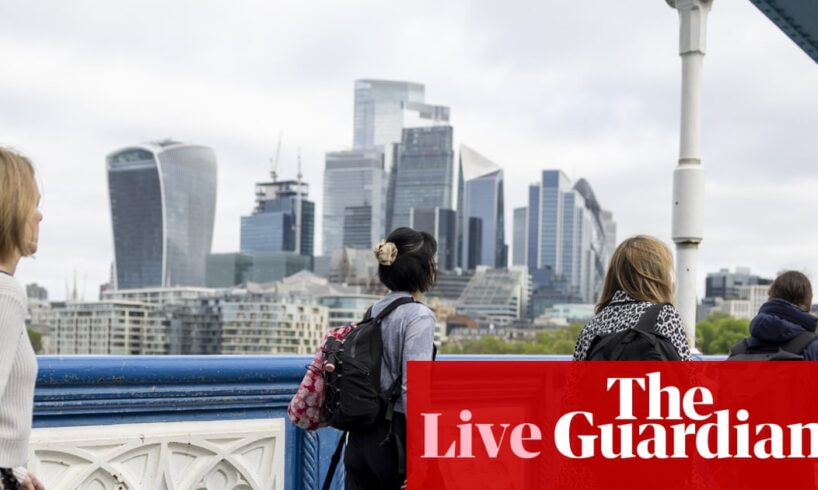
UK bank shares fall as City fears budget tax raid
Shares in UK banks are falling this morning as the sector fears it could be targeted in the autumn budget.
NatWest (-3.7%), Lloyds Banking Group (-2.8%) and Barclays (-2.3%) are leading the fallers on the FTSE 100 share index, reflecting rising concerns that chancellor Rachel Reeves could target banks to help shore up the UK’s public finances.
The IPPR think tank is this morning proposing that Rachel Reeves should levy a new bank tax. They argue that a “Thatcher-style tax on bank windfalls” could raise billions for public services.
The IPPR points out that the UK government is currently spending billions of pounds a year compensating the Bank of England for losses on its quantitative easing programme, which is now being unwound.
The BoE is also paying out higher interest rates on banks’ reserves than it is receiving on the bonds it still owns through QE.
In total, these losses amount to a £22bn-a-year hit to the public finances, according to the IPPR, which is calling for the Treasury to tax the big banks on their QE-related reserves.
Carsten Jung, associate director for economic policy at IPPR, said:
“The Bank of England and Treasury bungled the implementation of quantitative easing. What started as a programme to boost the economy is now a massive drain on taxpayer money. Public money is flowing straight into commercial banks’ coffers because of a flawed policy design. While families struggle with rising costs, the government is effectively writing multi-billion-pound cheques to bank shareholders.
“This is not how QE was meant to work – and no other major economy does it this way. A targeted levy, inspired by Margaret Thatcher’s own approach in the 1980s, would recoup some these windfalls and put the money to far better use – helping people and the economy, not just bank balance sheets.”
The Financial Times reports that fears are growing in the City of London that Reeves could announce a surcharge on the banking sector’s profits, or a new bank levy.
One City figure told the FT:
“We aren’t stupid. There’s a bunch of Labour MPs, including Angela Rayner, who are looking for ways to get more money. Financial services are an obvious target.”
Share
Key events
Show key events only
Please turn on JavaScript to use this feature
US consumer confidence fell in August
Another blow to the White House: US consumer confidence took a dive last month.
The University of Michigan has reported that its Index of Consumer Sentiment fell by 5.7% this month, to 58.2 points, down from 61.7 in July.
Consumers become gloomier about current economic conditions, and the outlook for the economy.
Photograph: University of Michigan
Surveys of Consumers director Joanne Hsu says:
Consumer sentiment confirmed its early-month reading, moving down about 6% from July. Sentiment now stands about 11% above readings from April and May but remains at least 10% below 6 and 12 months ago.
This month’s decrease was visible across groups by age, income, and stock wealth. Moreover, perceptions of many aspects of the economy slipped. Buying conditions for durable goods subsided to their lowest reading in a year, and current personal finances declined 7%, both due to heightened concerns about high prices. Expectations for business conditions and labor markets contracted in August as well.
That said, expectations for personal finances held steady this month, albeit at relatively subdued levels relative to a year ago
Share
Back in the US, a key measure of inflation has risen.
US PCE core inflation, seen as the Federal Reserve’s favourite inflation measure, has risen to 2.9% in July on an annual basis, up from 2.8% in June.
In line with consensus forecasts but high if 2% is the Fed’s true inflation target:
US PCE core inflation, often known as the Federal Reserve’s favorite measure, edged higher to 2.9% in July as the increase in service sector prices picked up to its hottest rate in five months.… pic.twitter.com/xgdBZuHDOB
— Mohamed A. El-Erian (@elerianm) August 29, 2025
Share
Canada’s economy shrinking as exports decline
Canada’s economy has been dragged to the brink of recession by Donald Trump’s trade war, in an headache for prime minister Mark Carney.
Real gross domestic product (GDP) across Canada declined by 0.4% in the second quarter of 2025, the country’s statistics office has reported, following a 0.5% gain in the first quarter.
Statistics Canada explains:
The contraction in the second quarter was driven by significant declines in the export of goods, as well as decreased business investment in machinery and equipment. These declines were tempered by faster accumulations of business inventories, higher household spending and lower imports of goods.
Canada has been sparring with the Trump White House for months; in March, Canada imposed retaliatory tariffs on the US in response to new tariffs on steel and aluminum.
Last week, Carney said some countertariffs would be dropped, as Ottawa tried to end the trade war.
Share
US trade deficit surges over $100bn in July
Newsflash: America’s trade deficit with the rest of the world widened sharply last month, as more goods poured into the US.
The US international trade deficit rose by 22% in July to $103.6bn in July, new data from the US Census Bureau shows. That’s an increase of $18.7bn compared with June’s deficit of $84.9bn.
The increase was due to a surge of imports into the US last month. That could be due to companies trying to front-run the latest tariffs from Donald Trump, which kicked in at the start of August.
Imports of goods in July rose to $281.5bn, $18.6bn more than in June. Exports of goods for July were $178.0bn, $100m less than June exports.
Share
Bank lobby group UK Finance (unsurprisingly) oppose another tax on the sector, saying:
“Banks based here already pay both a corporation tax surcharge and a bank levy.
“Adding another tax would make the UK less internationally competitive and run counter to the government’s aim of supporting the financial services sector.”
Share
UK house sales rose last month as activity continued its recovery following the end of the stamp duty holiday.
Official figures from HM Revenue and Customs showed property transaction rose 1% month-on-month in July.
It said there were 95,580 property sales last month, a 4% increase against July last year, following an increase in June.
This recovery followed a notable drop in house sales after changes to the stamp duty threshold at the start of April.
Share
SFO admits more Libor rigging convictions may be unsafe
The Serious Fraud Office has admitted today that the convictions of five former traders for interest rate rigging may be unsafe.
Following the Supreme Court decision to overturn the conviction of two traders, Tom Hayes and Carlo Palombo last month, the SFO has looked at other cases involving the rigging of the Libor and Euribor rates.
It says:
We consider that the jury directions, given at Hayes’ and subsequently Palombo’s trial and which were the basis of the court’s judgment, may apply to Jonathan Mathew, Jay Merchant, Alex Pabon, Philippe Moryoussef and Colin Bermingham’s trials. Therefore, their convictions may be considered unsafe.
Share
India’s economy grew faster than expected over the summer, new data shows, despite the threat of the Trump trade war.
India’s GDP expanded by 7.8% year-on-year in the April-June quarter, picking up from 7.4% in the previous three months, data released today showed.
Economists polled by Reuters had forecast a slowdown in growth to 6.7%.
Share
Number of unemployed people in Germany passes 3 million mark
German chancellor Friedrich Merz (left) meeting French president Emmanuel Macron before a Franco-German cabinet meeting in Toulon today Photograph: Manon Cruz/EPA
Over in Germany, the number of unemployed people has hit three million for the first time in a decade.
A total of 3.02 million people were unemployed in August in seasonally unadjusted terms, with an increase of 46,000 in the number of people out of work from the previous month.
Labour office head Andrea Nahles says:
“The labor market is still shaped by the economic slump of recent years.”
If you account for seasonal factors, though, the number of unemployed decreased by 9,000 to 2.96 million.
Even so, the rise in joblessness intensifies the pressure on chancellor Friedrich Merz to reform and stimulate the German economy.
Speaking in France today, Merz responded to the data:
“The rise in unemployment is not unexpected. However, the figure illustrates how necessary reforms are for more growth and employability. The German government will focus on this.”
Share
£7bn wiped off UK banks
The bank share selloff has gathered pace.
NatWest are now down 4.7%, followed by Lloyds (-4.5%) and Barclays (-3.7%), with HSBC down a more modest 0.5%.
By my maths, this wipes around £7bn off the value of the UK’s Big Four banks.
Share
UK stock market ends week on ‘sour note’ amid bank tax fears
The drop in bank shares has pulled down the wider London stock market.
The FTSE 100 share idex is down 25 points, or 0.27%, at 9192 points this morning
“The UK stock market ended the week on a sour note amid suggestions that the government could help to fill its fiscal hole with a new tax on the banking sector,” says Russ Mould, investment director at AJ Bell, adding:
“Some of the biggest names in the FTSE 100 are lenders so if they’re out of favour on the stock market, it acts as a drag on the whole UK blue-chip index.
“NatWest, Lloyds and Barclays were the FTSE 100’s biggest fallers on Friday morning as investors wondered if the era of bumper profits, dividends and buybacks is now under threat.
“These companies have enjoyed a strong run on the stock market in recent years, and they’ve also played an important role in lending money to small and large businesses which helps to create jobs and support the UK economy.
“The timing of the tax debate, fuelled by a report from think-tank IPPR, is unfortunate given it coincides with a new poll from Lloyds suggesting a rise in business confidence, despite cost pressures. This positive sentiment could be threatened if businesses take the view that a new tax on banks might force lenders to tighten their lending criteria.
Share
P&O Ferries have confirmed that CEO Peter Hebblethwaite is resigning, explaining:
“Peter Hebblethwaite has communicated his intention to resign from his position as Chief Executive Officer to dedicate more time to family matters. P&O Ferries extends its gratitude to Peter Hebblethwaite for his contributions as CEO over the past four years.
“During his tenure the company navigated the challenges of the COVID-19 pandemic, initiated a path towards financial stability, and introduced the world’s first large double-ended hybrid ferries on the Dover-Calais route, thereby enhancing sustainability. We extend our best wishes to him for his future endeavours.”
Share
Sky: Controversial P&O Ferries boss Hebblethwaite to quit
Sky News are reporting that Peter Hebblethwaite, the chief executive of P&O Ferries, is leaving the company.
Hebblethwaite, who was voted the “Worst Boss in the World” by trade unionists in 2022, has reportedly resigned for personal reasons.
Hebblethwaite attracted heavy criticism in 2022 after P&O controversially fired 800 crew without warning, and replaced them with low-paid agency staff working longer hours.
He subsequently receivd a pay rise of at least 55%.
Share
India’s rupee hits record low after Trump doubles tariffs
India’s currency has sunk to a record low, on fears that US tariffs will hurt its economy.
The rupee has dropped by -0.7% today to 88.23 rupees to the dollar, its weakest level on record.
India’s rupee against the US dollar Photograph: LSEG
Traders sold the rupee after Washington imposed an additional 25% tariff on Indian goods this week, doubling the total duties faced by the South Asian nation to 50%, as a penalty for buying Russian oil.
The tariffs, which came into effect just after midnight on Wednesday in Washington, risk inflicting significant damage on the Indian economy and further disrupting global supply chains.
Share
Source





